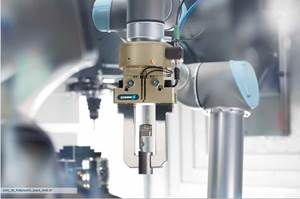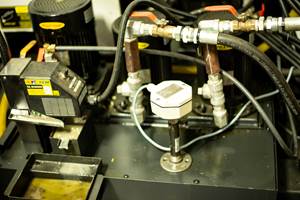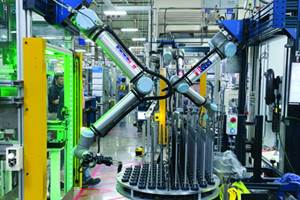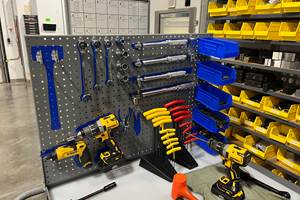Programmable Head Brings Five-Axis Machining To Three-Axis VMC
Having no prior experience with five-axis machining, this shop had two options: incur the hefty expense of purchasing a true five-axis machining center or explore less costly alternatives.
Share





Despite a knack for thinking creatively and maximizing efficiency, a customer of Upland Fab (Ontario, California) was still doing a critical job by hand. The manual job involved trimming complex aircraft doors and skins for an F-22. This customer approached the precision plastics shop in the hopes of improving costs and efficiencies by means of an automated course of action. Because the parts were larger than usual—exceeding 20 inches by 50 inches—and were quite complex, Paul Sapra, general manager at Upland Fab, realized that five-axis machining would be necessary. Because the parts were quite large, fixturing them to tilt/rotary tables would be difficult.
Having no prior experience with five-axis machining, Upland had two options: incur the hefty expense of purchasing a true five-axis machining center or explore less costly alternatives.
In business since 1970, the southern California company has carved a niche in close-tolerance, low-volume machining of glass- and carbon-filled materials. It produces access panels and exterior composites for various aircrafts, including the new A380 Airbus.
Initially housed in a 2,500-square-foot building, Upland Fab has grown from its humble beginnings into a 12,000-square-foot modern space with 30 employees. It has also made the transition from using manual machines to employing an arsenal of CNC equipment that includes a 6030, a 4020 VMC and six four-axis 15XT VMCs from Fadal Machining Centers (Chatsworth, California). The company also has a Cobra 42 CNC lathe and a Conquest 42 CNC lathe from Hardinge Inc. (Elmira, New York); a Puma with live tooling from Daewoo; and an Omni-Turn CNC lathe. The lathes are routinely employed to carry out secondary operations.
Over the years, Upland had come to rely on its collection of Fadal CNC mills for much of its machining needs. While researching options, Mr. Sapra consulted his Fadal distributor, Mike Pitts at Sundance Machinery, and a viable option compared to the costly venture of purchasing a five-axis machining center appeared. The solution was a programmable, five-axis spindle attachment from Tri-Tech Precision Products, Inc. (Anaheim, California). The company’s Fadal 6030 VMC was fitted with the head.
The contouring head has a 360-degree range of motion, so the shop can mill features on multiple sides of the same workpiece in one setup. Additional setups are not required to reorient the tool, in turn reducing overall time on the machine, says the manufacturer. The head is affixed to the spindle of a three-axis machine—in this instance a Fadal 6030—to add A and B rotary axes to the machine.
Given the demands of dealing with rather large parts, the company has found the head to be a more feasible option than using fixturing on rotary tables. A convenient consequence of using the head is that it can be removed from one machine and set up on another in a matter of minutes.
“In 15 minutes, we can remove the axis (and thus the five-axis capability) and run it as though it is one of the regular three-axis machines,” explains Mr. Sapra.
Being that the staff was well versed in MasterCAM software, Mr. Sapra was confident that five-axis programming would be possible in-house as well. Tri-Tech provided the shop with training and the necessary post-processors. The company says it was surprised by the ease with which its staff became acclimated to using the technology.
“In a matter of days, we were up and running and machining parts,” says Mr. Sapra.
Even though the company doesn’t receive a substantial amount of true five-axis work, the head simplifies other operations and is incorporated for use with materials other than composites.
“The seemingly infinite degrees of revolution of the head allow us to perform what would have been multiple complex machining operations in one setup,” explains Mr. Sapra. “We’ve found that this capability makes drilling compound angle holes easier; no complicated setups are required. In addition, we machine parts with the five-axis head as opposed to using our four-axis machine because the workholding is more simple.
“In-house, five-axis capabilities mean that we are able to offer increased value and flexibility to our customers,” he continues. “We are committed to investing in cutting-edge technology, and also in maintaining our place in the precision plastics industry.”
Related Content
Lean Approach to Automated Machine Tending Delivers Quicker Paths to Success
Almost any shop can automate at least some of its production, even in low-volume, high-mix applications. The key to getting started is finding the simplest solutions that fit your requirements. It helps to work with an automation partner that understands your needs.
Read MoreManaging Coolant with Skimmers, Refractometers and More
Bacteria-infected coolant harms machines and sickens machinists. Coolant management technologies like skimmers and automated systems counter this tendency.
Read More4 Steps to a Cobot Culture: How Thyssenkrupp Bilstein Has Answered Staffing Shortages With Economical Automation
Safe, economical automation using collaborative robots can transform a manufacturing facility and overcome staffing shortfalls, but it takes additional investment and a systemized approach to automation in order to realize this change.
Read MoreTranslating a Prototyping Mindset to Production
The experimental mindset that benefited BDE Manufacturing Technologies as a prototype job shop has given it an adaptable edge as a production facility.
Read MoreRead Next
5 Rules of Thumb for Buying CNC Machine Tools
Use these tips to carefully plan your machine tool purchases and to avoid regretting your decision later.
Read MoreSetting Up the Building Blocks for a Digital Factory
Woodward Inc. spent over a year developing an API to connect machines to its digital factory. Caron Engineering’s MiConnect has cut most of this process while also granting the shop greater access to machine information.
Read MoreRegistration Now Open for the Precision Machining Technology Show (PMTS) 2025
The precision machining industry’s premier event returns to Cleveland, OH, April 1-3.
Read More


















.png;maxWidth=300;quality=90)














